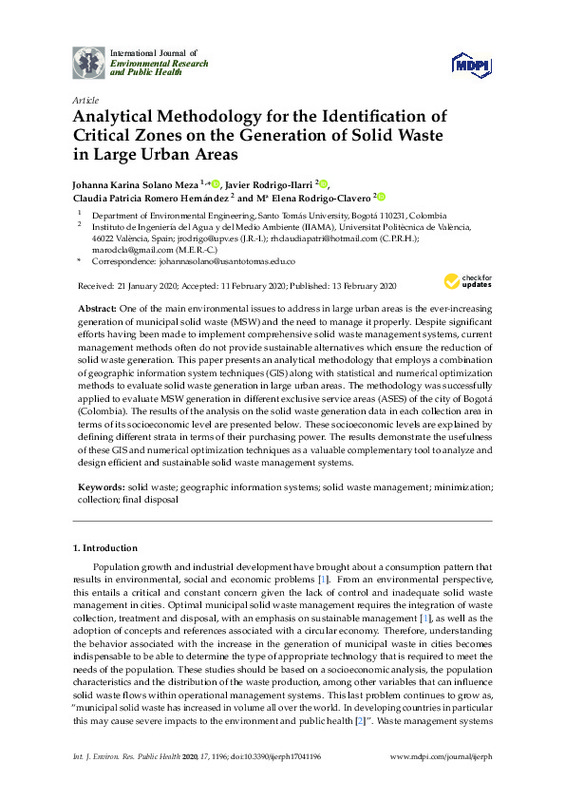Vitorino de Souza Melaré, A., Montenegro González, S., Faceli, K., & Casadei, V. (2017). Technologies and decision support systems to aid solid-waste management: a systematic review. Waste Management, 59, 567-584. doi:10.1016/j.wasman.2016.10.045
De S. Pereira, T., & Fernandino, G. (2019). Evaluation of solid waste management sustainability of a coastal municipality from northeastern Brazil. Ocean & Coastal Management, 179, 104839. doi:10.1016/j.ocecoaman.2019.104839
Colvero, D. A., Ramalho, J., Gomes, A. P. D., Matos, M. A. A. de, & Tarelho, L. A. da C. (2020). Economic analysis of a shared municipal solid waste management facility in a metropolitan region. Waste Management, 102, 823-837. doi:10.1016/j.wasman.2019.11.033
[+]
Vitorino de Souza Melaré, A., Montenegro González, S., Faceli, K., & Casadei, V. (2017). Technologies and decision support systems to aid solid-waste management: a systematic review. Waste Management, 59, 567-584. doi:10.1016/j.wasman.2016.10.045
De S. Pereira, T., & Fernandino, G. (2019). Evaluation of solid waste management sustainability of a coastal municipality from northeastern Brazil. Ocean & Coastal Management, 179, 104839. doi:10.1016/j.ocecoaman.2019.104839
Colvero, D. A., Ramalho, J., Gomes, A. P. D., Matos, M. A. A. de, & Tarelho, L. A. da C. (2020). Economic analysis of a shared municipal solid waste management facility in a metropolitan region. Waste Management, 102, 823-837. doi:10.1016/j.wasman.2019.11.033
Vučijak, B., Kurtagić, S. M., & Silajdžić, I. (2016). Multicriteria decision making in selecting best solid waste management scenario: a municipal case study from Bosnia and Herzegovina. Journal of Cleaner Production, 130, 166-174. doi:10.1016/j.jclepro.2015.11.030
Bui, T. D., Tsai, F. M., Tseng, M.-L., & Ali, M. H. (2020). Identifying sustainable solid waste management barriers in practice using the fuzzy Delphi method. Resources, Conservation and Recycling, 154, 104625. doi:10.1016/j.resconrec.2019.104625
Singh, A. (2019). Solid waste management through the applications of mathematical models. Resources, Conservation and Recycling, 151, 104503. doi:10.1016/j.resconrec.2019.104503
Dehghanifard, E., & Dehghani, M. H. (2018). Evaluation and analysis of municipal solid wastes in Tehran, Iran. MethodsX, 5, 312-321. doi:10.1016/j.mex.2018.04.003
Lella, J., Mandla, V. R., & Zhu, X. (2017). Solid waste collection/transport optimization and vegetation land cover estimation using Geographic Information System (GIS): A case study of a proposed smart-city. Sustainable Cities and Society, 35, 336-349. doi:10.1016/j.scs.2017.08.023
Zysk, E., Dawidowicz, A., Źróbek, S., & Źróbek, R. (2020). The concept of a geographic information system for the identification of degraded urban areas as a part of the land administration system - A Polish case study. Cities, 96, 102423. doi:10.1016/j.cities.2019.102423
Ferronato, N., Preziosi, G., Gorritty Portillo, M. A., Guisbert Lizarazu, E. G., & Torretta, V. (2020). Assessment of municipal solid waste selective collection scenarios with geographic information systems in Bolivia. Waste Management, 102, 919-931. doi:10.1016/j.wasman.2019.12.010
Erfani, S. M. H., Danesh, S., Karrabi, S. M., Gheibi, M., & Nemati, S. (2019). Statistical analysis of effective variables on the performance of waste storage service using geographical information system and response surface methodology. Journal of Environmental Management, 235, 453-462. doi:10.1016/j.jenvman.2019.01.061
Murray, A. T. (2019). Contemporary optimization application through geographic information systems. Omega, 102176. doi:10.1016/j.omega.2019.102176
Ghinea, C., Drăgoi, E. N., Comăniţă, E.-D., Gavrilescu, M., Câmpean, T., Curteanu, S., & Gavrilescu, M. (2016). Forecasting municipal solid waste generation using prognostic tools and regression analysis. Journal of Environmental Management, 182, 80-93. doi:10.1016/j.jenvman.2016.07.026
Singh, D., & Satija, A. (2016). Prediction of municipal solid waste generation for optimum planning and management with artificial neural network—case study: Faridabad City in Haryana State (India). International Journal of System Assurance Engineering and Management, 9(1), 91-97. doi:10.1007/s13198-016-0484-5
Nguyen-Trong, K., Nguyen-Thi-Ngoc, A., Nguyen-Ngoc, D., & Dinh-Thi-Hai, V. (2017). Optimization of municipal solid waste transportation by integrating GIS analysis, equation-based, and agent-based model. Waste Management, 59, 14-22. doi:10.1016/j.wasman.2016.10.048
Malakahmad, A., Bakri, P. M., Mokhtar, M. R. M., & Khalil, N. (2014). Solid Waste Collection Routes Optimization via GIS Techniques in Ipoh City, Malaysia. Procedia Engineering, 77, 20-27. doi:10.1016/j.proeng.2014.07.023
Gbanie, S. P., Tengbe, P. B., Momoh, J. S., Medo, J., & Kabba, V. T. S. (2013). Modelling landfill location using Geographic Information Systems (GIS) and Multi-Criteria Decision Analysis (MCDA): Case study Bo, Southern Sierra Leone. Applied Geography, 36, 3-12. doi:10.1016/j.apgeog.2012.06.013
Al-Salem, S. M., Al-Nasser, A., & Al-Dhafeeri, A. T. (2018). Multi-variable regression analysis for the solid waste generation in the State of Kuwait. Process Safety and Environmental Protection, 119, 172-180. doi:10.1016/j.psep.2018.07.017
Duan, N., Li, D., Wang, P., Ma, W., Wenga, T., Zhong, L., & Chen, G. (2020). Comparative study of municipal solid waste disposal in three Chinese representative cities. Journal of Cleaner Production, 254, 120134. doi:10.1016/j.jclepro.2020.120134
Niska, H., & Serkkola, A. (2018). Data analytics approach to create waste generation profiles for waste management and collection. Waste Management, 77, 477-485. doi:10.1016/j.wasman.2018.04.033
Solano Meza, J. K., Orjuela Yepes, D., Rodrigo-Ilarri, J., & Cassiraga, E. (2019). Predictive analysis of urban waste generation for the city of Bogotá, Colombia, through the implementation of decision trees-based machine learning, support vector machines and artificial neural networks. Heliyon, 5(11), e02810. doi:10.1016/j.heliyon.2019.e02810
[-]









